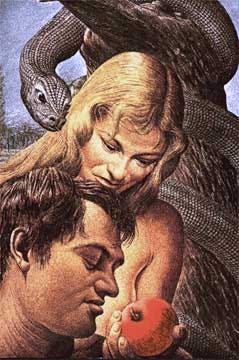‘But for an apple’: The worst way to read the story of The Fall
Darkness is the default. Life is what happens after you fall.
Imagine a perfect world. Lush gardens, no work, no money, nothing to do really but be fruitful and multiply.
Then, one day, a talking serpent approaches.
In Genesis 3:1 he asks Eve: “Did God say, ‘You must not eat fruit from any tree in the garden?”
The serpent’s question is masterful. What he’s really asking is, “what were you told?”
But by slightly misstating what God said, Adam and Eve feel the need to correct him.
Genesis 3:2-3, Eve does just that.
“We may eat fruit from the trees in the garden, but God did say, ‘You must not eat fruit from the tree that is in the middle of the garden, and you must not touch it, or you will surely die,’” Eve tells the serpent.
She’s already said too much. The proper response to a probing question from a stranger is, “who are you?” And proper response, when asked what someone else told you, is “Why do you want to know?” Why are you asking me? How is it my place to divulge that conversation?
Any one of those questions would’ve reset the dynamic. Instead, the serpent does a motivational interview, contradicting what God told Adam and Eve. What comes after eating the apple, the serpent says, is not death. But life with the blinders off.
“God knows that when you eat of it your eyes will be opened, and you will be like God, knowing good and evil,” the serpent says in Genesis 3:5.
This is often portrayed as a lie. But it’s not.
Genesis 3:22 quotes God: “The man has now become like one of us, knowing good and evil.”
Just as the snake said. The snake wasn’t wrong. He just spoke against God’s interests.
But wait a minute — wasn’t Eden a perfect, frictionless place? Why was one of God’s perfect creatures acting against the Creator? Reminds me of the time a guy named Lucifer got kicked out of Heaven’s choir.
We expect the Bible’s lessons to come straightforward. We expect the book to say what to do, and what not to do. We take comfort in it.
But Adam is more of an object lesson. He warns of the dangers of weak male leadership that fails to speak God’s word or protect the family.
Adam is with Eve the entire time. He says not a word as a snake talks himself and his helpmate into violating the only order God gave. This is God’s perfect man?
When caught, Adam snitches on Eve and blames God for sending her. To put it gently, the men of Genesis are not your guides to an heroic masculinity.
So we follow in Adam’s footsteps, but never his example.
The Bible calls this story the Fall of Man, so we call it that. We are taught from a young age that, but for that apple, we’d all be living God’s perfect plan, in Eden.
But there’s a reason man fell so quickly. Eden may have been paradise, but it reads boring.
We don’t get but a few verses of Adam and Eve together before the Fall. How much can you read about flora and fauna and lack of responsibility?
Humans don’t arrive until Genesis 2, they fall in chapter 3, and Cain kills Abel in chapter 4.
If you think these people would’ve all lived happily ever after in Howdy Doody Land, but for that apple, you misunderstand the story you’re reading, the lessons therein, and the troubled nature of the characters you meet. They were all “touched.” And they’d say the same about us, if given a chronicle of our worst moments.
Perfection was never the point. What you call the Fall is actually the point of the book. That’s why 99.9% of the Bible takes place afterward.
Genesis 1:2 shows that darkness is the default. The light had to be created.
No fall, no rise. No dark, no light. No slavery, no Exodus.
If Joseph wasn’t thrown into a ditch and sold to the Ishmaelites, he never gets to Egypt.
If he’s never jailed on a false rape accusation from Potiphar’s wife, his visions never reach Pharaoh, and he never leads Egypt through the famine. (Though I have my own libertarian concerns with how he did it.)
As Joseph told his worried brothers in Genesis 50:20 after father Jacob dies, and they worry he will now take revenge: “You intended to harm me, but God intended it for good…”
Don’t worry so much about setbacks, or falls. You’re not perfect, and you don’t need to be.
How we respond after the fall is the point of the book, and the point of our lives.






Thanks for the encouragement!
Remember the point, "it's what matters what we do after the fall," as well, that we suffer through trials, sometimes longsuffering trials, that will bring about a plan of God we could not have fathomed.